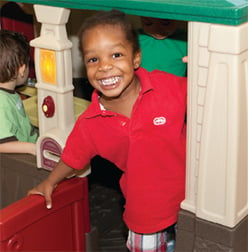 As of July 2004, all babies born in the state of Ohio receive a free hearing screening before they go home from the hospital. The Universal Newborn Hearing Screening (UNHS) legislation has been helpful in detecting hearing loss sooner and allowing families to begin helping their babies earlier. Typically, hearing is tested at birth, and, if it’s normal, is not tested again until approaching age 4. This usually takes place on a visit to the pediatrician. Hearing is screened again when the child enters school. Many schools then alternate between vision and hearing screenings during the school-age years.
As of July 2004, all babies born in the state of Ohio receive a free hearing screening before they go home from the hospital. The Universal Newborn Hearing Screening (UNHS) legislation has been helpful in detecting hearing loss sooner and allowing families to begin helping their babies earlier. Typically, hearing is tested at birth, and, if it’s normal, is not tested again until approaching age 4. This usually takes place on a visit to the pediatrician. Hearing is screened again when the child enters school. Many schools then alternate between vision and hearing screenings during the school-age years.
The period between birth and age 4 is critical for learning speech and language and many other skills that enable a child to enter school prepared to learn. UNHS help us catch hearing loss as soon as possible and can sometimes help identify children who are at risk for losing their hearing and need to be monitored frequently in early years. Another good indicator of hearing ability is overall speech and language development.
Children learn language by listening to those around them. If what they hear is distorted, or not heard at all, this can be reflected in their own speech and language output. Listed here are some signs of hearing and speech development to be aware of with your child as they grow, and may indicate whether or not they should be screened or tested further.
Does your baby…
Birth to 3 Months
• React to loud sounds?
• Soothe to the sound of your voice/singing?
• Turn their head or eyes toward you when you speak?
• Awaken to loud voices and sounds?
• Smile when spoken to?
• Seem to know your voice and quiet down if crying?
3-6 Months
• Look up or turn toward a new sound?
• Respond to “no” and/or changes in your tone of voice?
• Imitate sounds using his/her own voice?
• Enjoy rattles and other toys that make sounds?
• Begin to repeat sounds such as “ooh”, “ahh”, “ba-ba”?
• Become scared by a loud noise or voice?
6-10 Months
• Know words for common things (cup, shoe) and sayings (“bye-bye”)?
• Make babbling sounds, even when alone?
• Respond to requests such as “come here”?
• Look at things or pictures when someone talks about them?
• Respond to his/her own name, telephone ringing, someone’s voice – even when not loud in volume?
10-15 Months
• Play with own voice – making funny noises – enjoying the sound and feel of it?
• Point to or look at familiar objects or people when asked to do so?
• Imitate simple words and sounds; may use a few words meaningfully (mama, dada)?
• Enjoy games like peek-a-boo and pat-a-cake?
15-18 Months
• Follow simple directions, such as “Give me the ball?”
• Use words he/she has learned often?
• Comment, point to objects, vocalize or use word approximations?
• Understand simple “yes-no” questions (“Are you hungry?”)
• Know and use approximately 50 words (even if approximations of adult forms)?
• Understand simple phrases (“in the cup,” “on the table”)
• Enjoy being read to?
• Point to pictures or objects when asked?
18-24 Months
• Use 2-3 word sentences to talk and ask for things (“where ball?” “we go?”)
• Quickly find where a sound is coming from?
• Point to body parts when asked?
• Enjoy simple songs like “Twinkle, Twinkle Little Star”, or other simple stories and rhymes?
24-36 Months
• Understand simple concepts like “not now” and “no more”?
• Choose things by size? (big, little)
• Follow a simple two-step direction such as “get your shoes and bring them to me”?
• Begin to use articles of speech (“a”, “the”) and word endings (“-ing”, “-ed”)?
• Engage in short dialogues?
3-4 Years
• Hear you when you call form another room?
• Hear the TV or radio at the same volume as the rest of the family?
• Answer simple “who,” “what,” “where,” and “when” questions?
4-5 Years
• Hear and understand most of what is said to him/her at home and at school?
• Hear well in different situations and around different people (grandparents, teachers, babysitter, family members)?
• Enjoy simple storybooks and can answer simple questions about the story?
Please remember that is it normal for children to vary greatly in their development of skills, but if you have concerns about your child’s hearing or speech development, take action sooner rather than later. Talk to your pediatrician or schedule an appointment for an evaluation at Cleveland Hearing & Speech Center.









